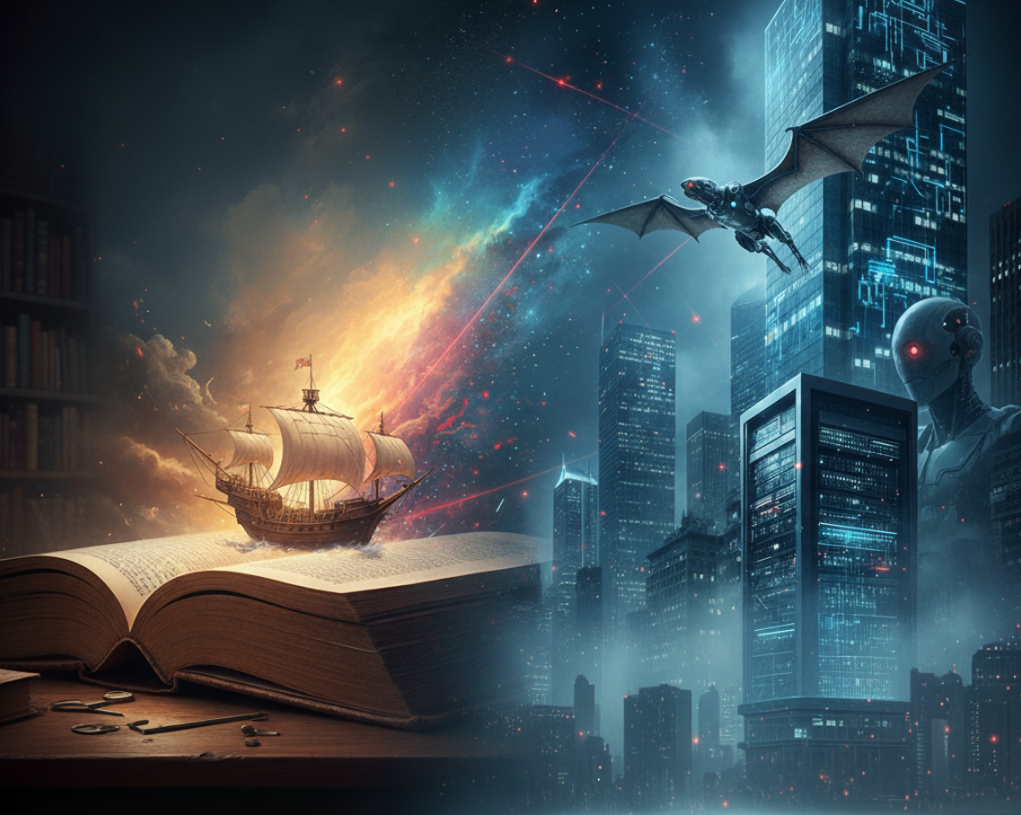World of Fiction
Nidaa Shahid
11 September 2025


For centuries, stories have been an escape for people to get away from the mundanity of everyday life. From books to movies, rare is a person who does not enjoy a good action-packed fable. However, for the keen eyes and sharp minds, fiction often contains more than fantasy. It offers glimpses into real-world dangers lurking in front of our very eyes.
The latest iteration of the popular Hollywood saga, Mission Impossible: the Final Reckoning, presents one chilling example of such realism. This movie introduced a new kind of enemy: not a terrorist or a rogue agent, but an all seeing, all knowing sentient artificial intelligence (AI), known only as ‘The Entity’. It infiltrates global digital infrastructure; from banking systems to surveillance networks to the most terrifying of all: nuclear command and control structure of the nine nuclear weapon states. If viewed in isolation, this movie might seem like the usual exaggerated, over the top Hollywood spectacle, however, is it really that unrealistic?
While currently there are no AI models which have reached sentient levels or taken control of nuclear missile silos, however, technological evolution clearly suggests that this is not beyond the realm of possibility. Today’s large language AI models can write complex code, disobey commands given by their human handlers and spread misinformation at a hitherto unprecedented scale. Some AI models have even invented their own language to communicate while keeping the human out of the loop. On the military front, AI has already been embedded in autonomous defence systems like drones and missiles. The US military has been testing AI assisted battlefield decision-making for decades. Thus, the infrastructure imagined in this movie is not mere fiction, it is already under construction.
Zooming out, it becomes clear that unprecedented technology is not the only thing movie have been warning us about. Another Hollywood franchise, released a decade ago, called The Hunger Games showcased a dystopian world where an elite pampered class is throwing lavish parties and wearing absurd fashion while the outer districts suffer from starvation, poverty and tyranny. Today, the parallels are striking and deeply uncomfortable. On one hand we have the opulent elite of the western world showcasing their wealth at the Academy Awards or the Met Gala. These events are surreal in their opulence, increasingly resembling the excesses shown in The Hunger Games. Meanwhile, the suffering of people in places like Gaza or Sudan, equivalent to modern day districts, is relegated to the background noise of the newsfeed. Thus, in both fantasy and reality, wealth is accumulating at the centre while pain is ignored at the periphery and entertainment is the soothing distraction.
The most unsettling aspect of these two examples is not just the resemblance with the real world, it is how predictable it all was, and how little the world did to change course. George Orwell’s ‘1984’ warned about surveillance culture long before smartphones and smart homes normalised it. Another cult favourite, ‘The Black Mirror’, showed a world obsessed with likes and ratings years before social credit systems became a reality. ‘Planet of the Apes’ sounded the alarm on climate change a decade before the world started paying any attention to the actual matter. Calling it ‘just a movie’ has repeatedly provided an excuse to ignore uncomfortable truths hidden in plain sight: that what we dismiss today as fiction is often foresight in disguise.
The world of fiction is now clearly pointing towards a new emerging threat. Tech advancements, once confined to the speculative, are no longer just theoretical. They are here, they are unregulated, and they are advancing at an unprecedented pace. Simultaneously, power is concentrating in fewer hands, wealth inequality is ballooning, and trust in democratic systems is eroding. None of this should come as a surprise though. We have seen it all before, on pages and on television screens.
The question which arises is where do we go from here? At the onset, labelling all fictional narratives as implausible is deeply problematic as it fosters a utopian world view. While not every dystopian vision is a prophecy, many are grounded in realities which are measurable and require immediate attention. Additionally, there is a need to recognise the role of imagination not just in predicting disaster, but in preventing it. If the human mind is capable of imagining the worst, then it is also capable of imagining better alternatives. The only impediment is the will to act.
Thus, the danger today is not that something like ‘The Entity’ could exist. The danger is not even the increasing wealth and power disparity in the world. The real danger is that by the time we realise that we are living in the early chapters of a dystopia, it might already be too late to rewrite the ending.


The Centre for Aerospace & Security Studies (CASS) was established in July 2021 to inform policymakers and the public about issues related to aerospace and security from an independent, non-partisan and future-centric analytical lens.

@2025 – All Right Reserved with CASS Lahore.